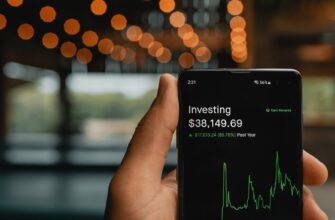🎮 Level Up with $RESOLV Airdrop!
💎 Grab your free $RESOLV tokens — no quests, just rewards!
🕹️ Register and claim within a month. It’s your bonus round!
🎯 No risk, just your shot at building crypto riches!
🎉 Early birds win the most — join the drop before it's game over!
🧩 Simple, fun, and potentially very profitable.
- Why Crypto Wallet Anonymity Matters More Than Ever
- 7 Best Practices to Anonymize Your Crypto Wallet Safely
- 1. Generate New Addresses for Every Transaction
- 2. Use Privacy-Focused Cryptocurrencies
- 3. Implement Strategic Coin Mixing
- 4. Sever Digital Footprint Links
- 5. Enhance Network Anonymity
- 6. Secure Hardware Wallet Usage
- 7. Maintain Operational Discipline
- Frequently Asked Questions (FAQs)
- Final Thoughts: Privacy as an Ongoing Practice
Why Crypto Wallet Anonymity Matters More Than Ever
In today’s digital landscape, anonymizing your cryptocurrency wallet isn’t just about privacy—it’s a critical security measure. Blockchain transactions are permanently recorded on public ledgers, meaning anyone can trace wallet addresses back to real-world identities through metadata leaks, exchange KYC data, or behavioral patterns. High-profile hacks, phishing scams, and targeted attacks often start with de-anonymization. By implementing robust anonymization practices, you protect not just your financial assets but your personal safety in an increasingly surveilled crypto ecosystem.
7 Best Practices to Anonymize Your Crypto Wallet Safely
1. Generate New Addresses for Every Transaction
Most modern wallets automatically create unique receiving addresses. This prevents transaction clustering—where analysts link multiple payments to one entity. Always:
- Enable “generate new address” features in wallets like Electrum or Exodus
- Never reuse addresses for incoming transactions
- Separate addresses by purpose (e.g., savings vs. spending)
2. Use Privacy-Focused Cryptocurrencies
Not all blockchains are equal. Opt for coins with built-in anonymity features:
- Monero (XMR): Uses ring signatures and stealth addresses
- Zcash (ZEC): Offers shielded zk-SNARK transactions
- Dash: PrivateSend mixes coins through masternodes
3. Implement Strategic Coin Mixing
Coin mixers (tumblers) obfuscate transaction trails but require caution:
- Use decentralized mixers like Wasabi Wallet’s CoinJoin
- Verify mixer reputation through community reviews
- Avoid custodial mixers holding your coins
- Mix in small, irregular amounts over time
4. Sever Digital Footprint Links
Prevent connections between your identity and wallet:
- Never post wallet addresses on social media
- Use separate devices for crypto activities
- Clear metadata from transaction descriptions
- Avoid public Wi-Fi for wallet access
5. Enhance Network Anonymity
Mask your IP address and location:
- Always connect via Tor or VPN before accessing wallets
- Use privacy-focused browsers like Brave
- Disable JavaScript on wallet-related sites
- Consider running your own node
6. Secure Hardware Wallet Usage
Hardware wallets like Ledger/Trezor boost security but require anonymization:
- Purchase anonymously with cash if possible
- Initialize with offline-generated seeds
- Never connect to exchange accounts with KYC
- Use passphrase features for hidden wallets
7. Maintain Operational Discipline
Sustainable anonymity requires ongoing habits:
- Regularly consolidate UTXOs (unspent transaction outputs)
- Dusting attack awareness: Ignore micro-transactions
- Verify all receiving addresses manually
- Update software only from official sources
Frequently Asked Questions (FAQs)
Q: Is crypto wallet anonymization legal?
A: Yes, privacy practices are legal in most jurisdictions. However, deliberately hiding assets for illegal activities (tax evasion, money laundering) remains unlawful. Consult local regulations.
Q: Can exchanges trace anonymized wallets?
A: Exchanges with KYC requirements can trace withdrawals to your first external address. Use intermediate privacy steps (e.g., mixing) before sending to exchanges.
Q: How effective are crypto mixers?
A: Decentralized mixers provide strong anonymity when used correctly. Effectiveness depends on pool size, mixing patterns, and avoiding timing analysis.
Q: Does using Tor/VPN guarantee anonymity?
A: No—they’re layers of protection. Combine with other practices like new addresses and privacy coins. Avoid logging into personal accounts while using crypto wallets.
Q: How often should I rotate wallets?
A: No fixed schedule. Rotate when addresses accumulate significant value or after high-risk transactions. Balance operational security with convenience.
Q: Are privacy coins truly untraceable?
A> Monero and Zcash offer the strongest privacy, but implementation matters. Use official wallets and default privacy settings for maximum protection.
Final Thoughts: Privacy as an Ongoing Practice
Anonymizing your crypto wallet isn’t a one-time setup—it’s a continuous security mindset. By layering these techniques (new addresses + privacy coins + network anonymity + operational habits), you create a robust privacy shield. Remember: Absolute anonymity is impossible, but making your wallet a “hard target” significantly reduces risks. Stay updated on emerging threats like quantum computing risks and adapt your practices accordingly. Your financial sovereignty depends on proactive protection.
🎮 Level Up with $RESOLV Airdrop!
💎 Grab your free $RESOLV tokens — no quests, just rewards!
🕹️ Register and claim within a month. It’s your bonus round!
🎯 No risk, just your shot at building crypto riches!
🎉 Early birds win the most — join the drop before it's game over!
🧩 Simple, fun, and potentially very profitable.








